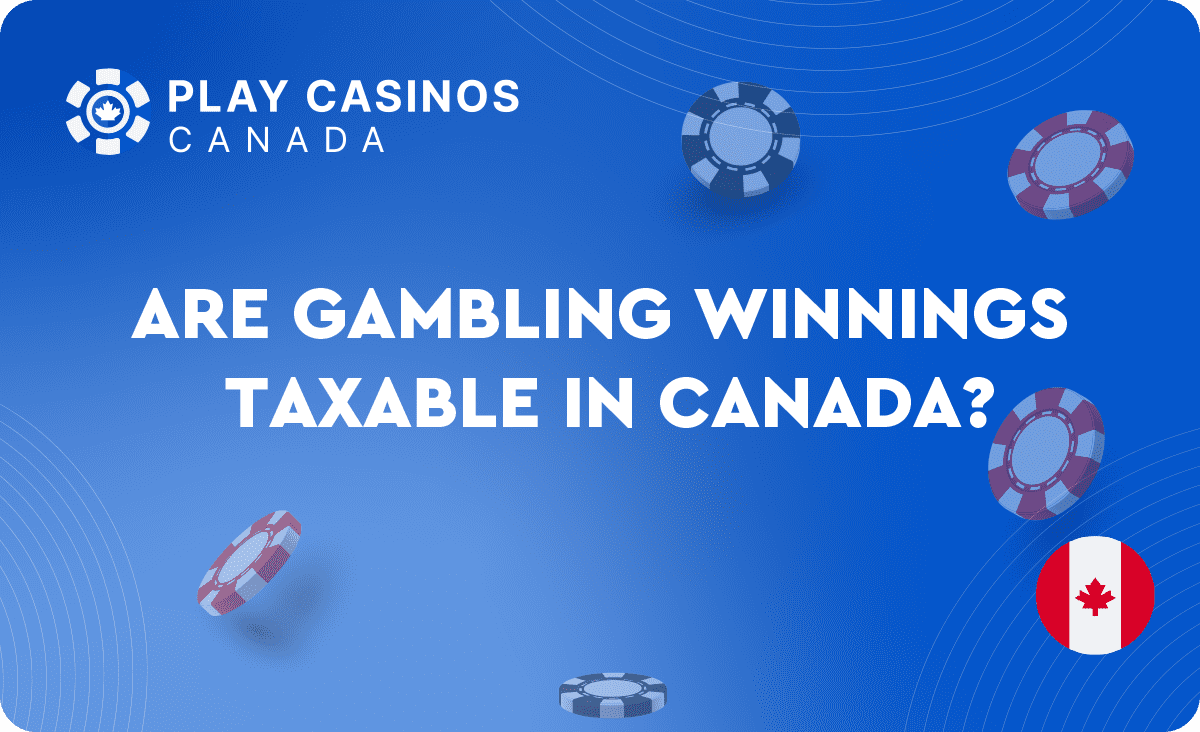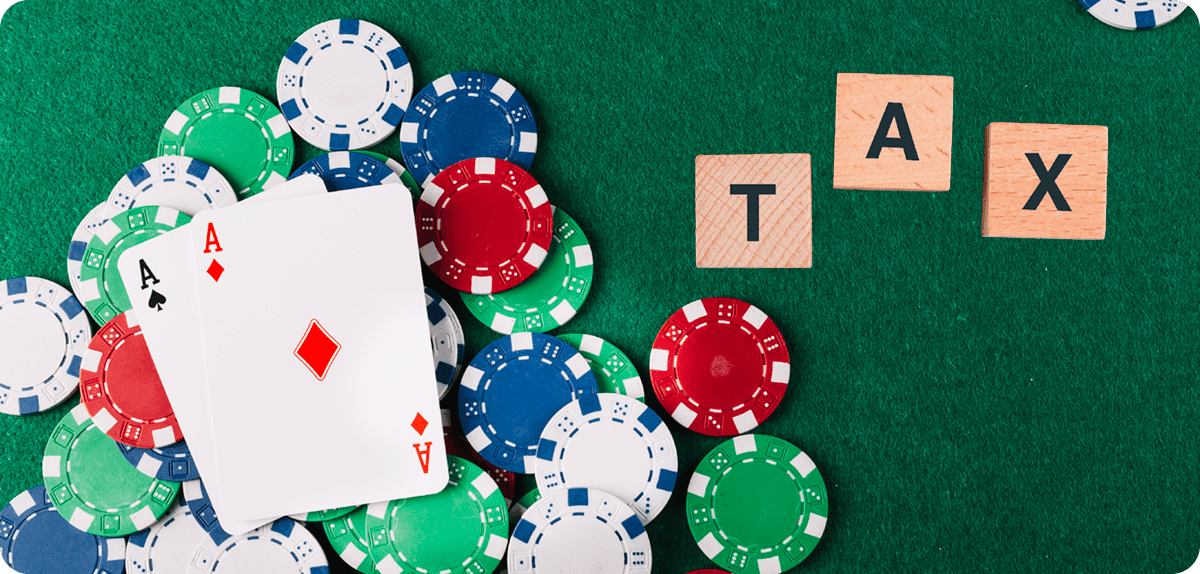Are Gambling Winnings Taxable in Canada?
Gambling has become a popular pastime in Canada, and some individuals have made quite impressive winnings from various online and offline gambling activities such as horse racing, casino games, sports betting, or lotteries.
Taxation on gambling is, probably, the least likely thing for you to consider while having fun spinning slots, betting on your favourite football team, or, let’s say, rolling dice. However, the question still arises. Are your gambling winnings taxable in Canada?
When it comes to both online gambling and betting in real life, one must unquestionably understand the nitty-gritty of income tax consequences. In this quick explanation, we will specify whether or not your gambling gains are taxed. But, keep in mind that every circumstance is unique, and if you play games of chance regularly, you might need to counsel a knowledgeable solicitor.

Is there a Gambling Winnings Tax in Canada?
In this exciting world of gambling now many Canadians wonder, “will the taxman come knocking on my door after a lucky streak at the casino?” Fear not, my friends, for casino-related activities are not considered a regular source of income and cannot be taxed as such. In other words, you can keep that slot machine jackpot all to yourself without worrying about a hefty tax bill.
People who gamble as a hobby or compulsively are generally exempt from taxation on their casino winnings, even if they consistently win and have a system for betting. The courts have held that winning enough money gambling to make a living is not, by itself, considered taxable income. The degree of interest or zeal to which a person devotes to betting also does not change its nature. An organized system for minimization of risk is what distinguishes the intemperate wagerer from the professional gambler. In short, if a person is a casual punter, they are not required to pay taxes on their gambling winnings in Canada while a professional gambler is.
This is all supported by the Canadian Tax Law documents in force. The Canadian Income Tax Act ‘s 40(2)(f) principle states that a Canadian taxpayer won’t be taxed on their gains or losses from a chance to win a prize or bet in a lottery scheme or pool system of betting. This means that generally, gambling wins aren’t taxed.
However, if you happen to earn interest on your winnings, you must declare it through a T5 form or a Statement of Investment Income alike. Don’t try to hide it, folks, because the CRA can slap you with some serious fines if they catch wind of any undeclared interest.
It’s important to know that the Minister of National Revenue may sometimes decide that certain individuals’ gambling winnings should be taxed as income from a business activity, based on factors like organization, special knowledge or inside information, and the extent of the individual’s gambling activities.

Are Your Gambling Winnings Considered a Regular Source of Income?
Let’s delve into the exciting world of gambling and taxes! The rules can be a bit tricky, so let’s break it down. If you’re earning profits from bookmaking or operating a gambling establishment, congrats, you’ve got yourself a business and will be expected to pay taxes on those earnings. But, if you’re simply enjoying some friendly wagers or hitting up the online casino occasionally for some fun, you can breathe easy as those winnings won’t be taxed.
How Do Gambling Taxes work?
The Canadian Income Tax Act includes all income from productive sources inside or outside Canada. This list includes employment, business, and property, among others. However, certain sources of income like windfall gains, gifts, online casinos, betting, and lottery winnings are not considered sources of income tax.
Whether casino winnings are taxable depends on the person’s intent to carry on the activity to pursue profit. And it is the role of Canadian tax courts to examine the facts and circumstances of each case and to determine whether a taxpayer’s gambling activities should be considered a source of income subject to taxation.
Only by examining all of the facts and their complete gaming behaviour can it be decided if a punter is conducting an organized gambling business and, therefore, receives a business income. There is no one defining factor. However, the tax court judge may consider and take into account the following traits:
- How well-organized the gaming operations are of the person in question.
- Whether the player has any unique expertise or inside information that offers them an advantage.
- Whether the Canadian player bets for fun or makes their living,
- How frequently and how much they gamble.
- Whether Canadian taxpayer’s income includes gambling profits from games that depend on chance or the actual skill and training.
Professional Gambler?
Now, here’s where things get a bit murkier. If you’re engaging in chance-taking activities regularly and systematically, the Canada Revenue Agency may see you as operating a gambling business and therefore, you’ll be expected to pay taxes on your earnings. The tricky part is determining what constitutes a “taxable business income”. While activities like playing the lottery may lack the hallmarks of a sufficiently commercial manner, the CRA may still consider them as such if the frequency and systematic nature of the activity are indicative of a business.
But wait, there’s more! There are some exceptional cases where gambling activities have been held to be taxable, such as when a Canadian taxpayer uses inside information, knowledge or skill to reduce the element of chance. And, if you’re a pool shark who regularly takes advantage of inebriated opponents, be prepared to pay gambling taxes on your winnings.
Ultimately, the question of whether a taxpayer’s gambling activities are considered a regular source of income and therefore taxable is a question of fact that can only be determined by examining all of the circumstances and the Canadian taxpayer ‘s entire course of conduct. So, if you’re unsure about whether or not you need to pay taxes on your gambling earnings, it’s best to consult with a lawyer.

Professional Gamblers vs Recreational Punters
Professional Canadian gamblers like Daniel Negreanu, the second biggest poker star Timothy Adams or online poker player Michael Watson wager full-time and make a living from it, with playing as their primary source of income counting millions of CAD. They are motivated by profit and often have specialist gambling knowledge, attend tournaments and travel to gamble, and have highly organized gambling pursuits.
Professional poker players, blackjack experts, or any other professional gambler are viewed as operating their own business and must pay tax. However, they can accumulate and claim gambling losses and this way reduce their taxable income. Amateur punters, on the other hand, who do not have any reasonable expectation of profit, are not required to pay income tax on their gambling winnings. For semi-professional gamblers, the determination of taxable income can be complex and depend on factors such as their frequency of gambling, use of strategy, and consistency of earnings.
How Much Do Professional Gamblers Have to Pay?
Professional gamblers are required to pay taxes on their gambling winnings in Canada. The exact amount they pay in taxes depends on the amount of their winnings, their tax bracket, and other factors such as expenses related to their gambling activities.
The tax rate for business income, which includes gambling income, varies depending on the province or territory and the total amount of income earned. As a rule, the federal tax rate for business income ranges from 9% to 15%, while provincial or territorial tax rates range from 4% to 16%.
Are Gambling Losses Tax Deductible?
In fact, they are. Just like with another type of business or property source, professional gamblers can also write off their gambling losses and other associated business expenses, which can reduce their taxable income and lower the amount of taxes they owe. It is exactly the case when they are involved in the poker business which requires considerable amounts to partake in the tournaments, namely pay for trips, entry fees, etc.
It’s highly recommended that professional gamblers consult with a tax professional or accountant to ensure they are accurately reporting their income and expenses and paying the appropriate amount of taxes.
Real-Life Vs Online Gambling Winnings
When we deal with the income tax in gambling, everyone plays by the same book in Canada. the taxation of gambling winnings is generally identical for both real-life and online casinos. Everything, basically, depends on what kind of a gambler you are. The same gambling gains, for instance, may or may not be income tax-free, if we compare an amateur player and a gambler with a professional poker career. This applies to nearly any type of casino winnings.
How is Online Poker Taxed?
Just like any other gambling activity, a taxpayer’s poker activities can be tax-free or not. It has nothing to do with the nature of the game, rather than the commercial involvement of the Canadian gamblers.
If you play poker online as a recreational bettor, you’re free as a bird. However, if you are a professional poker player and earn a significant amount of income from playing poker online, you are required to report your winnings on your income tax return.
Are Lottery Winnings Taxed in Canada?
Unlike poker winnings, lottery gains are generally not taxed as they are considered to be luck-based. The Canadian Tax Law does not impose income tax on winnings from most lottery games, including charitable lotteries and sweepstakes. This means that if a Canadian wins money from a lottery, they will not have to pay tax.
Does the Gambling Tax Law Differ from One Province to Another?
All Canadian provinces and territories have identical gaming winnings tax legislation and income tax regulations. No matter where they live, all residents of Canada are subject to the federal Income Tax Act. This means that when it comes to gambling taxes, the same laws and regulations apply whether you reside in Ontario, British Columbia, or any other province or territory. The sorts of gambling that are permitted or accessible in various provinces and regions may differ, though. Apart from that, each province and territory may have its own rules and legislation controlling the operation of casinos and other gaming businesses inside its borders.
Let’s Draw a Bottom Line Here
 In conclusion, when it comes to taxation on gaming activities in Canada, there are several criteria, such as the type of gambling (lottery, betting on horse racing, sports, fantasy games, etc), the frequency of gaming, and whether the punter is categorized as amateur or professional, all affect how gambling losses and capital gains are perceived by the Canadian Taxation Law and Tax court judges, in particular.
In conclusion, when it comes to taxation on gaming activities in Canada, there are several criteria, such as the type of gambling (lottery, betting on horse racing, sports, fantasy games, etc), the frequency of gaming, and whether the punter is categorized as amateur or professional, all affect how gambling losses and capital gains are perceived by the Canadian Taxation Law and Tax court judges, in particular.
Regardless of whether they play at online or physical casinos, recreational bettors are exempt from paying taxes on their profits. Whereas professionals must report their gains and pay duties on them, on the flip side of the coin, they are also allowed to file their gambling loss claims and any related costs.
FAQ about Taxes on Winnings
No, lottery winnings in Canada are generally not taxable as they are considered windfall winnings that are based solely on luck.
In general, we may say "No", if this is not their job or what they do for a living. Otherwise, the taxpayer's activities may be regarded as one with sufficient organized effort and proven to be professional. In this case, income taxes must be imposed.
Generally, no. In accordance with the Income Tax Act, horse racing winnings are non-taxable in Canada.
You can prove them by keeping accurate records of your gaming and betting activities. This includes keeping track of your wins and losses, as well as any expenses related to your gambling, such as travel expenses, entry fees, and other related costs.
Unprofessional gamblers do not need to pay taxes on their winnings, regardless of the amount. However, professional gamblers are required to report all of their gambling income, regardless of the amount.
If you are a regular casual player at a land-based or online casino, you can take home your winnings without any income tariff consequences.
The amount of taxes you pay on sports betting depends on whether you are a recreational gambler or a professional gambler. Recreational gamblers do not need to pay taxes on their winnings.
Gains from betting online are non-taxable for Canadians unless this is a professional gambler (for instance, poker winnings at world poker tournaments).
